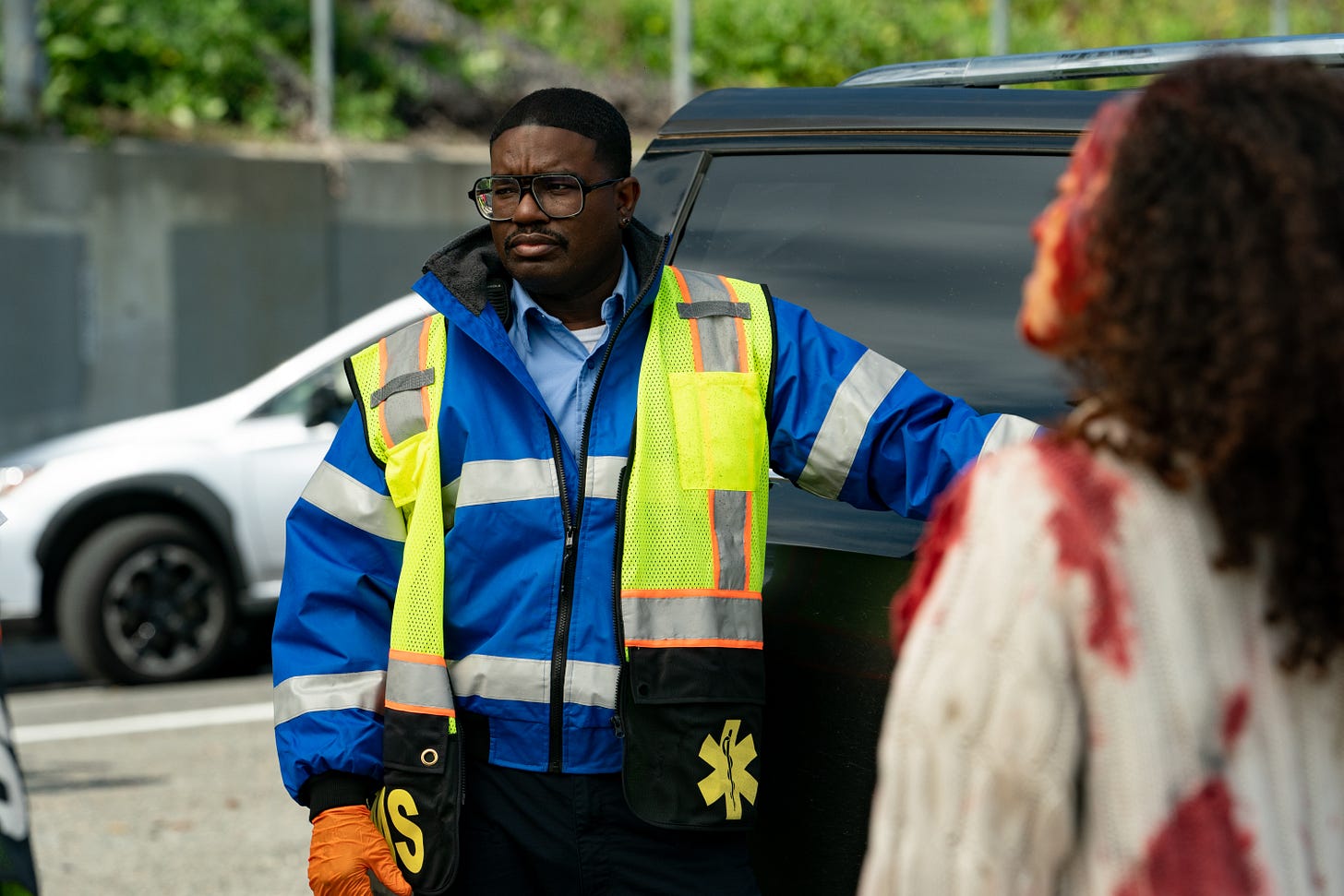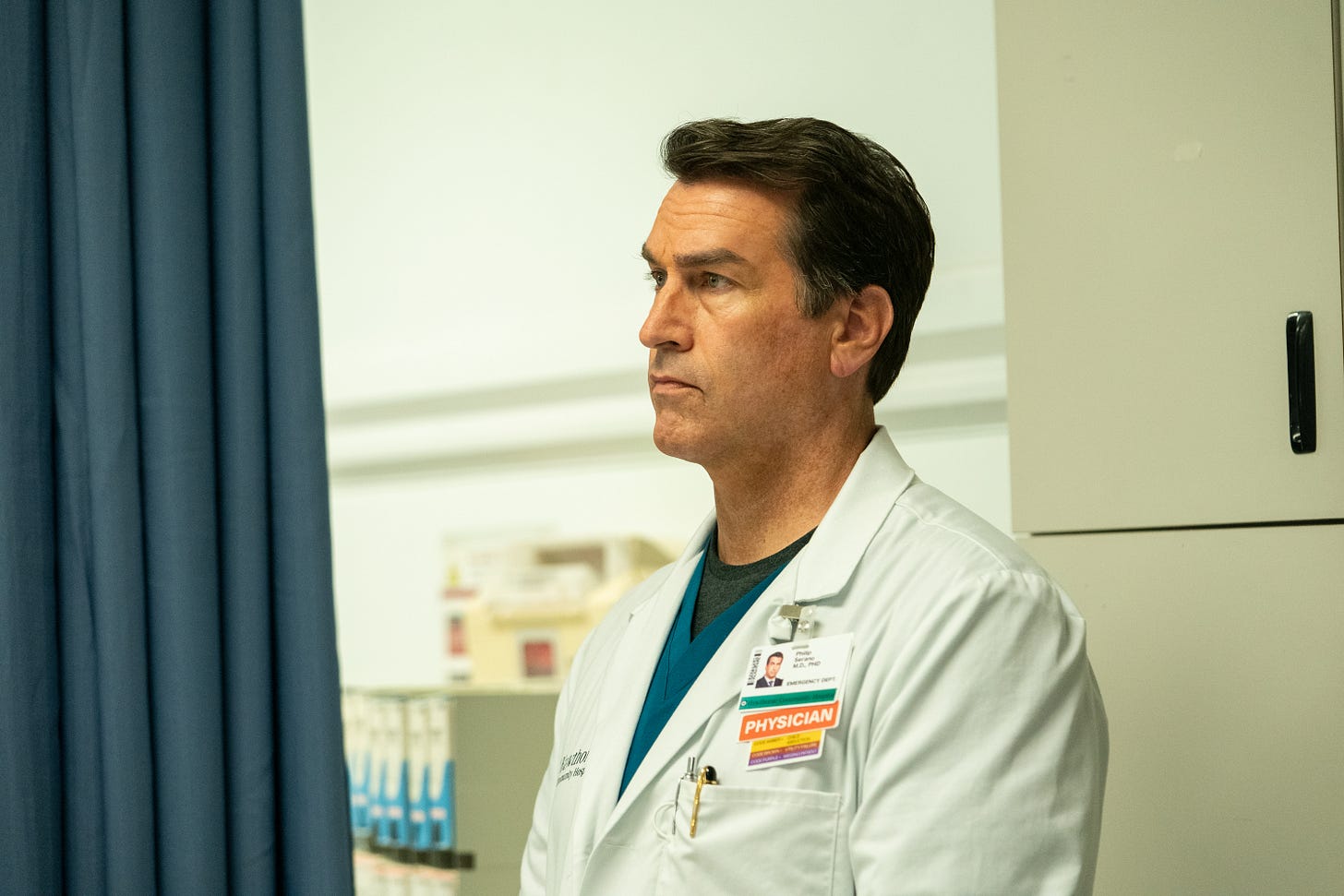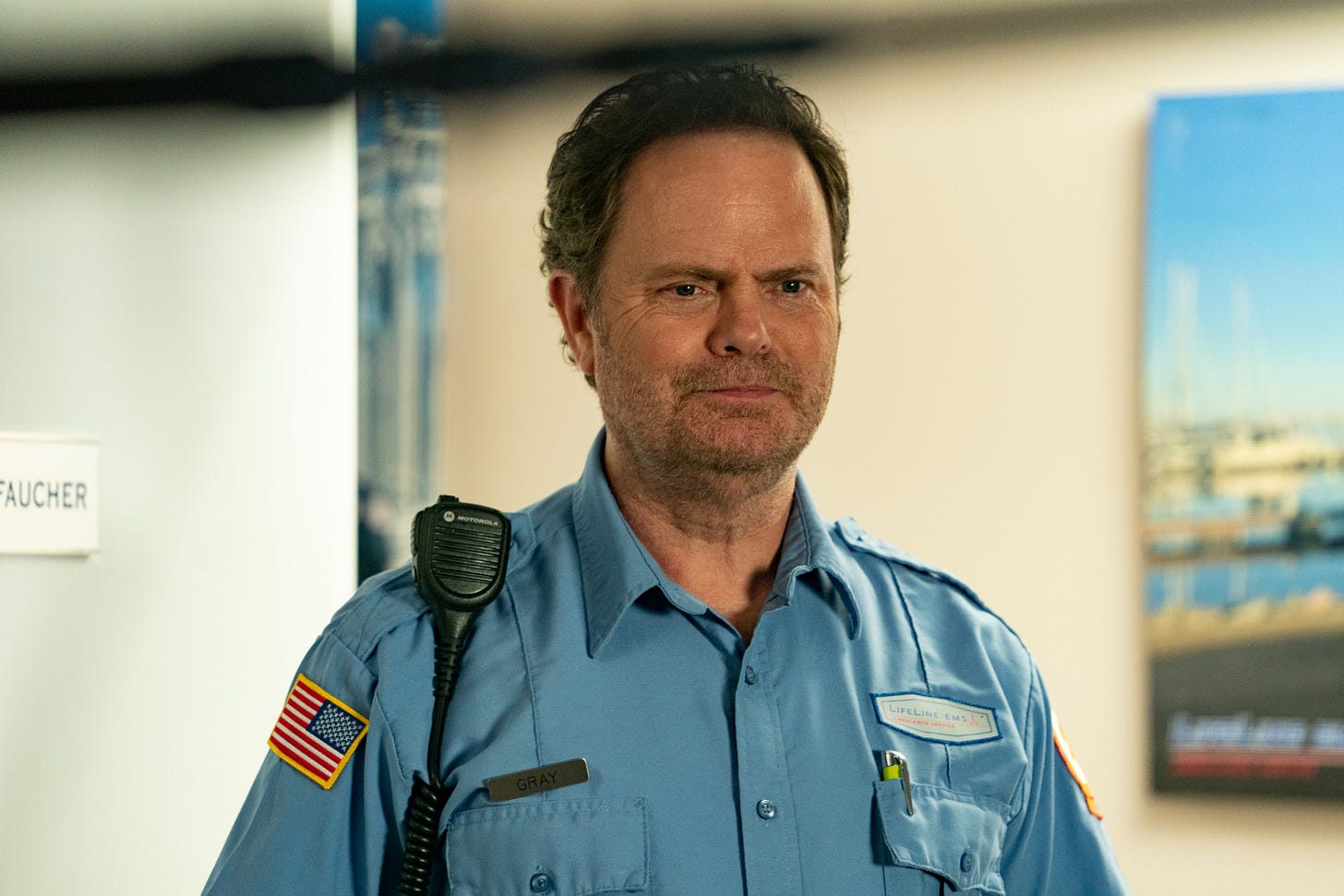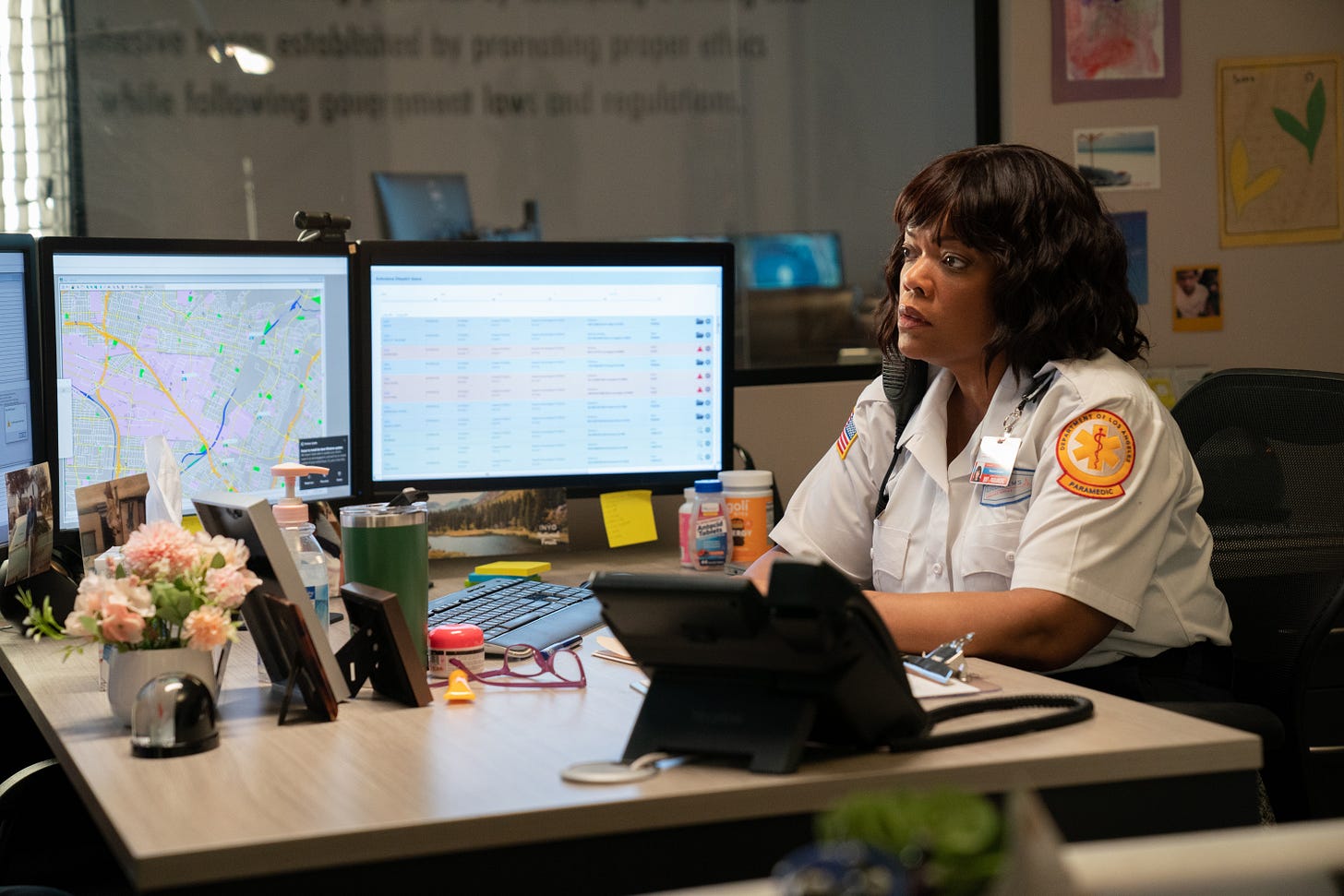'Code 3' filmmakers interview: Paramedic dramedy 'turns expectations upside down'
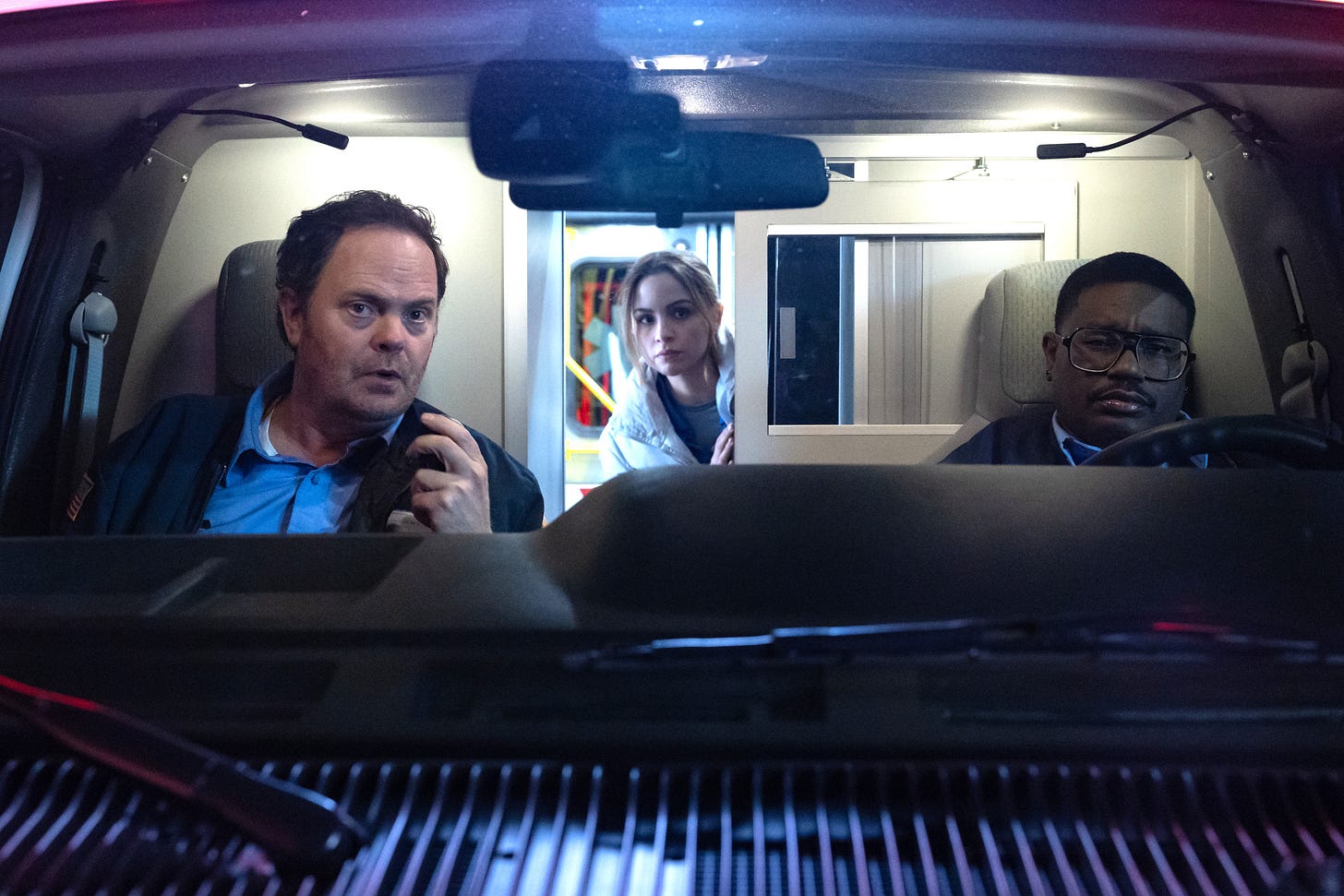
The independent film Code 3 — out today, September 12 — walks a fine line. It stars Rainn Wilson as Randy, a paramedic who is burnt out after almost two decades on the job and endures a grueling 24-hour shift where he and fellow paramedic Mike (Lil Rel Howery) and trainee Jessica (Aimee Carrero) see all manner of horrors.
It’s a comedy.
But the tricky balancing act succeeds thanks in large part to Wilson, who brings a world-weary emotional authenticity to his role. Years of seeing the worst moments in people’s lives hang heavily on him. But Wilson, best known for his Emmy-nominated role as Dwight on The Office, is also an expert comedian whose sense of humor brings levity to the story without undermining his sense of empathy. As the film careens from a mental health case with a patient wandering the streets with no pants on, to a mental health case that could end in a needless police shooting, to an 11-year-old boy whose heart stops after he’s hit in the chest with a baseball, Wilson and his co-stars ground the story and carry the audience through the best and the worst of it.
The film is directed by Christopher Leone from a script by Leone and Patrick Pianezza. It was inspired by Pianezza’s actual experiences as a paramedic, which comes through in the film’s earnest advocacy for the underpaid, underappreciated first responders; Rob Riggle appears in a supporting role as an arrogant emergency room doctor who demeans Randy at every turn like a Bizarro version of Noah Wyle’s heroic healer from The Pitt, highlighting the relative lack of respect afforded to Randy’s — and Pianezza’s — profession.
I discussed the film with Leone and Pianezza. Watch our interview below or read the following transcript.
Your film, Code 3, doesn't shy away from the tragedies that paramedics experience or from the gallows humor that paramedics use to cope with all of that. How difficult was it to find the balance to lead the audience through all the ups and downs?
Patrick Pianezza: The tone of the film is one of those things that was really challenging to do, so when we're talking about the gallows humor, that's really kind of the relief valve of those of us that have done that job because it's really the only way for us to offload some of that.
And it's almost like inside baseball for us. Like, we will get together and we'll talk about stuff, and it helps us decompress when we try to expand that to a broader audience. If I'm at dinner and I'm telling my family some story, oftentimes that story gets pared down quite a bit because they don't want the rated-R version of the story. They want the PG version of the story.
So being able to thread that needle was something that we worked really hard on. But the best and only way to be honest is to tell that story with humor, because we can get much deeper, much darker, much more insightful if we use humor as kind of an on-ramp to that.
Christopher Leone: Patrick's take on this movie about paramedics, about a very tough job as a comedy was so mind-blowing to me. The fact that you could tell the truth that way, which was one of our biggest goals, was to try to make the experience of what it's like to be a paramedic.
And that's where the tone comes from and why that journey is so crazy because that's the job. There's moments that are very high energy. There's moments that are very funny. There's calls that are kind of pointless and silly. And then there's calls that are tragic, and in the real job, you can bounce from one to the other.
And how do you capture that in a movie? That feeling, like I said, to try to get a glimpse of what that job really is for people. Because I think we all see it on television. We all think we know what the job is, and we really have no idea.
Patrick, you yourself were a paramedic. What made you want to put those experiences in writing?
Pianezza: It was really a homework assignment. I was a paramedic all through college, both undergrad and grad school. So I was a paramedic for a little over a dozen years. I took a creative writing course as part of my undergrad, and the professor said something very cliché, but it was the first time I'd ever heard it. He said, if you want to tell a compelling story, write what you know. And quite literally that night I just came off this brutal 14-hour shift, and the only thought that went through my brain was, “You want a story? I'll tell you a story,” and cranked out this short story that ultimately became the skeleton of the script that you see today.
After that, my brother, this is all his fault. My brother's a producer on the film, Paul Pianezza. He was the one who pushed me to write a script. He's the one who got it in front of Chris, and the rest of the way was fortuitous luck and dogged determination and Chris's brilliance. But this all stemmed from a homework assignment of someone who was just really, really burnt out at the time.
What was the collaboration like between the two of you working on the script when Christopher came on board?
Leone: Well, for me, I was starting with a script that I, like I said, found totally fascinating. Patrick had just kind of opened up his veins and just spilled out all these weird experiences he had in the form of a comedy. So a lot of the job for me was actually Patrick and I just talking and him just telling me about the job, and he would just tell me things sometimes — he was so deep in the job, he didn't even know how weird they were. He would just mention to me, for instance, that nobody ever dies in the ambulance. He would just say that in passing. I'd be like, what do you mean nobody dies in the ambulance? And he's like, no one ever dies in the ambulance. They're not allowed. It's legally impossible. And I was like, that's insane. But it’s just the way it works when you're a paramedic. If you start working on somebody, you’ve got to keep working on them. Only the doctor or a coroner can declare them dead. And so that has to go in the movie. And so we just kept finding all these strange details.
I said, for me, it's through the looking glass, right? Most of the time when you see a paramedic in a movie, they're wheeling the hero in. At the end of the movie, they're wheeling the hero in the back of the ambulance. Whereas the real job is not at all what you think and full of details that you would never imagine. So it's almost like science fiction: it's got its own rules and its own universe. And as you explore it, it was completely mind-blowing to me. And the more we talked about it, you discover things. Well, why are paramedics this burned out? So the movie keeps expanding and you actually find out more about the struggles in the healthcare system and how things really work. It's completely fascinating to me and very funny and high-energy at times, but then also heartbreaking.
Pianezza: And as far as the collaboration goes, you couldn't have asked for a better partner. And I mean that with all sincerity. Chris and I have been working on this for the better part of almost 15 years at this point and developed quite a strong friendship to the point that even when we were on set, I would never supersede him, but I would nudge him if something looked off, and I would just say like, hey, this looks off.
Leone: It was critical to have Patrick as technical supervisor on set. One, because every call was based on a real call, so he'd lived the job. In every detail, it was a big goal of ours to try to get it as medically accurate as we could and really wanted any paramedic, any real EMS worker to be able to watch the movie and go, wow, they got it right. So we tried very, very hard to do right by them.
You've got Rainn Wilson in the leading role, of course. He has to bring together the drama and the comedy of the film. He's excellent at both. At what point did he come on board, and what did he bring to the role that you found special?
Leone: I was already a huge Rainn Wilson fan before he was ever attached to the movie. I loved him in Super, and I loved him in Six Feet Under, and of course we all know him as Dwight Schrute on The Office. I was obsessed with him, partially because he's able to bring layers of a character into one, especially a comedic role like Dwight. I think why Dwight is one of the most iconic TV characters ever is that he's not just hilarious. There's a depth to him. There's real compassion and love. But also I think Rainn brings this danger to Dwight, right? When he cuts up a CPR doll, it's like, yeah, that guy's rendered a lot of deer carcasses in his day.
And I think coming to a role like this where he brings all that depth — he can be really funny, and as he gets stressed out he gets even funnier, but then all this compassion and pathos and heartbreak. So when I heard that Rainn liked the script, I was really excited and honestly I was a little nervous to meet him. But he was so smart. He was so good at pushing the script to be better, just pushing it to be deeper and funnier. So that was a pleasure. He really had a sense of what the movie should be and helped us get there.
Pianezza: I think you could not have had a more perfect portrayal of this job and that role done better. I think everything Chris said, his ability to bring the emotional weight of what this job can do and balance it with the humor was incredible to see in real time. And then you also see this depth of compassion that is beyond the bedrock of what he has left to give, but he still finds it in himself to provide that empathy to the people that are in crisis, even when he doesn't have enough for himself anymore was gut-wrenchingly, tearfully amazing to see.
And it coincided very beautifully with what Chris and my motives were for the film, and that was, as Chris already mentioned, to be medically accurate, but to never insult those people that are in crisis. We set up things to be funny around the situation, but we really worked intentionally hard to make sure that we're never making fun of the person, the patient that's having a problem.
What do you both hope people will take away from this film when they see it?
Pianezza: My goal is that anyone who does the job at whatever level of training that they have, that they feel seen, appreciated, and validated for the work that they're doing, I know after doing the job for so long that it is a thankless job and the hours that we put into training and education to make sure that we are at the top of our game when you need us is oftentimes just an assumed thing that the community has without understanding the toll that it takes on the individual providers. So for me, I want people who are in the job to say, number-one, hey man, they got it right. And number-two, they get it.
The biggest thing we've been seeing in comments is, oh my God, it feels like someone's finally telling our story and telling it accurately. And that to me is the highest level of respect. Yes, I want to be an entertainer. Yes, I want to tell a compelling story, but especially with a story that's so personal to me, I want the people that do the job to really feel like we see you and we appreciate the stuff that you're doing.
Leone: And for me, I'm not a paramedic, I'm a movie director. So I never lived it. I have no idea. But for me, I was trying to create the feeling of, what if you were the fourth paramedic in that ambulance, right? What if you went along for the ride for the night and witnessed all this stuff and felt what they feel? And again, when you find out what the job really is, the movie I think turns your expectations upside down.


